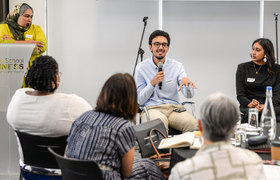‘Don’t retrofit curricula to include disability; engage at the design stage’ – PhD graduand
19 July 2023 | Story Helen Swingler. Photo Jean Claude Nsabimana. Read time 10 min.
Retrofitting the university’s curricula to include disability is an expensive and challenging exercise. Instead, it should be part of engagement up front, at the design stage. This recommendation was among the primary findings from University of Cape Town (UCT) PhD graduand Ikechukwu Nwanze’s doctoral thesis.
Ikechukwu’s doctoral study makes an important contribution to fully understanding and incorporating disability into UCT’s academic fabric and is integral to the diversity and inclusiveness that underpins UCT’s Vision 2030.
The Nigerian student is one of 104 inspirational PhD graduands, and among 36 from the Faculty of Health Sciences, who will be capped in the Sarah Baartman Hall on 21 July. His dissertation is titled “How do students and staff understand equitable access to the curriculum at UCT for students with visual impairments?”
Although his PhD focuses on students with visual impairments, his thesis and its findings make a strong argument for any form of disability that prevents full student participation in the curriculum and in curriculum planning.
Ikechukwu’s PhD supervisors were Professor Judith McKenzie of UCT’s Department of Health and Rehabilitation Sciences, and Dr Kevin Murfitt of Deakin University in Australia.
“We must investigate and understand what leads to equitable access.”
Ikechukwu is a UCT staff member in the Division of Disability Studies. His PhD stemmed from his concern that for all its good intentions, UCT’s Vision 2030 could exclude students with visual and other disabilities.
“We must investigate and understand what leads to equitable access,” he said.
Holistic approaches
This work goes beyond the sterling efforts of UCT’s Disability Service, the provision of information communication technologies, or assistive technology. This last is described by the World Health Organization as technology that helps people to “live healthy, productive, independent and dignified lives, and to participate in education, the labour market and civic life”.
A more holistic approach is needed; one that helps and supports academics to understand the complexities of disability, and the needs of students with disabilities, said Ikechukwu.
While the COVID-19 pandemic had education institutions scrambling to make their academic offering available online, it was a golden opportunity for the PhD student to explore how equitable access to the curriculum for visually impaired students was understood.
In his thesis, Ikechukwu approached the task using four conceptual framework components.
First, he explored the effects of the hidden curriculum – the unwritten, unofficial and often unintended lessons, values and perspectives that students learn – on the enacted curriculum. The latter refers to lecturer–student interactions in class and is focused on the actual curricular content.
Second, he used the Universal Design for Learning (UDL) to explore enablers such as assistive technology. UDL is described as “an educational framework based on research in the learning sciences, including cognitive neuroscience, that guides the development of flexible learning environments and learning spaces that can accommodate individual learning differences”.
Third, he used the eight elements of digital literacies (cultural, cognitive, constructive, communicative, confident, creative, critical, civic), to explore students’ opportunity to acquire digital literacies. This is embedded in the United Nations Convention on the Rights of Persons with Disabilities and their right to education.
Fourth, Ikechukwu used Q-methodology to conduct his study. This is a hybrid format employing both quantitative and qualitative methods, and is used to study opinions, values or beliefs to answer questions about “what” or “how”. It highlights shared viewpoints, and areas of consensus and disagreement.
Using Q sorting, Ikechukwu collected data from students with visual impairments, lecturers, staff from the Disability Service, UCT’s Information and Communication Technology Services, UCT Libraries and the Centre for Higher Education Development.
Key findings
Ikechukwu’s research yielded seven key findings. Briefly, these are:
- The lack of institutional responses means academic staff are left to rely on their own understandings of disability. They must be adequately supported.
- UCT must embrace a UDL, which moves from a deficit view of students with visual impairments to an asset view.
- Ongoing UDL workshops will help academics manage the balance between their responsibilities but leave time to engage in accessible curriculum practices.
- Universities must adopt operational models that design curriculum and support services with accessibility in mind from the start.
- UCT must adopt an institutional policy that is informed by UDL practices, with the eight elements of digital literacies at the core.
- Monitor the implementation of institutional policy on disability in academics’ key performance areas, supported by ongoing workshops.
- Decentralise curriculum accessibility and support services from Disability Service to all UCT departments.
Joining the dots
Ikechukwu completed his undergraduate degree in business systems through Monash University before building websites for clients. But there was little personal interaction and engagement in his work, and he sensed he would be better suited to working in a field that deals with how people relate to one another.
Having fallen in love with Cape Town, he took a job at UCT’s Education Development Unit as an IT trainer, and subsequently as a project manager at the Division of Disability Studies. His IT skills would come into play after he enrolled for UCT’s Postgraduate Diploma in Disability Studies; course convenor Professor McKenzie asked Ikechukwu if he could make the course accessible online for students with disability.
For visually impaired students, this encompassed screen readers, alternative text for images, and accessibility checkers that help them to read everything on the screen.
It was an awakening, said Ikechukwu.
“That was when I saw the link – that information technology has a huge part to play in disability inclusion, and more so because we are moving into the Fourth Industrial Revolution. Digital and online accessibility and accessible curricula became my passions.”
Complexities and sensitivities
During his research, he also found that lecturers want to include disability in their courses and content.
“They want to make their courses accessible to all. But they don’t always know how to go about it; there are time constraints, and sensitivities around disability that they may not know how to handle. Not all of us are comfortable dealing with emotive issues.”
There are also competing tensions between research and teaching commitments.
Institutional support should include training workshops on how to implement UDL for students: how to present information in multiple ways (videos, audio and transcripts – transcripts are especially important for students in low-resource settings). These introduce students to the digital literacies that students need to be able to engage in the online world: media literacy, visual literacy and computer literacy.
The context of disability is also important, said Ikechukwu.
“The way an academic understands disability influences the way they want to include disability in their content, and particularly its structure and presentation online. Different disciplines need to be helped to see the connection.
“Meaningful inclusion has to look at full participation in the curriculum for students with visual impairment. And it must become more than a box-ticking exercise.”
Included in the task are more inclusive ways of conducting student assessments.
“We found that one of the best ways to transform society is through disability inclusion in the curriculum.”
“Sit down with your course designer and think of the multiple ways students can express knowledge: such as orally, or through role play.”
The ramifications of a curriculum that is equitable, fully accessible and meaningful, and truly engaging, stretch beyond the university, he said.
“We found that one of the best ways to transform society is through the curriculum; because if you can get graduates to carry that knowledge into the workplace when they graduate, you have a bigger chance of influencing society.”
Who should read Ikechukwu’s thesis? All those responsible for teaching and learning and transformation in education institutions, from the top down, he said.
He hopes his PhD research will also help other African universities transform their curricula and develop more holistic approaches to course design. He is also keen to take this a step further in the future, through a study on how Africans view disability and accessibility.
“It’s so satisfying. Because when you are considering disability inclusions, you end up accommodating other diversity … Disability is a transformative issue.”
Right now, the highlight of graduation is imminent. Although Ikechukwu’s close family live in Nigeria, he will be celebrating with his supervisors, friends and colleagues at the ceremony and with his family later, towards the end of the year.
 This work is licensed under a Creative Commons Attribution-NoDerivatives 4.0 International License.
This work is licensed under a Creative Commons Attribution-NoDerivatives 4.0 International License.
Please view the republishing articles page for more information.










